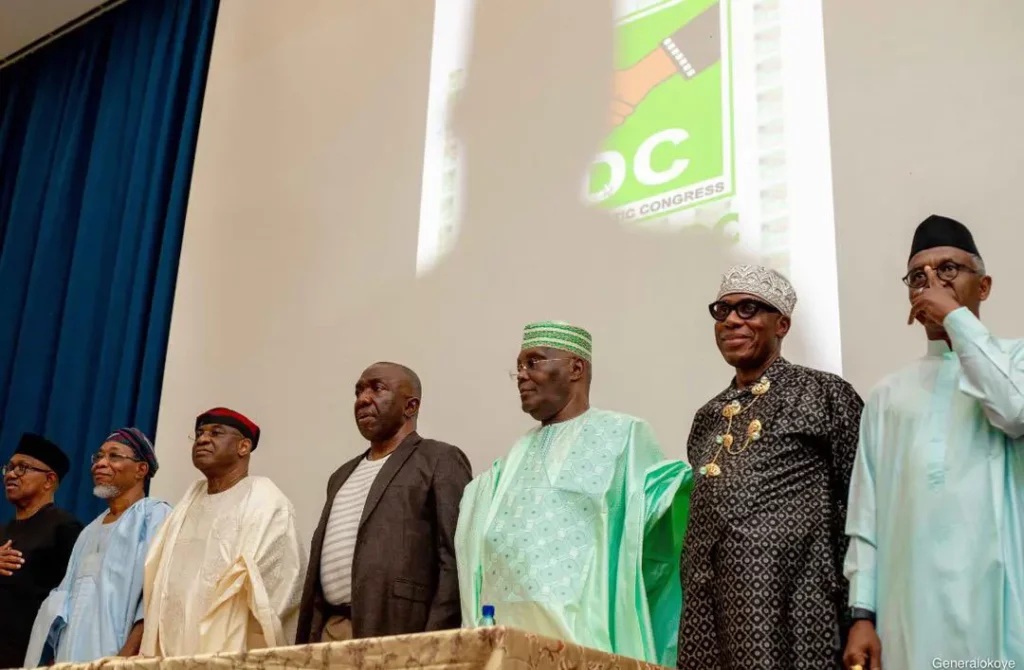The recent adoption of the African Democratic Congress (ADC) by the opposition coalition led by former Vice President Atiku Abubakar marks a pivotal moment in Nigeria’s political landscape, potentially signaling a formidable challenge to the ruling All Progressives Congress (APC) ahead of the 2027 general elections.
This strategic move, however, is not without internal dissent and controversy, raising questions about the coalition’s cohesion and the future of Nigeria’s dominant party system.
Opposition Coalition Adopts ADC as Political Platform
After prolonged negotiations and delays in registering their preferred party, the All Democratic Alliance (ADA), with the Independent National Electoral Commission (INEC), the opposition coalition opted to adopt the ADC as their official platform to contest the 2027 elections.
This decision was finalized following a marathon meeting that extended into the early hours of July 2, 2025.
The coalition has appointed prominent political figures to lead this new phase:
- former Senate President David Mark as interim National Chairperson,
- ex-Osun State Governor and former Tinubu ally Rauf Aregbesola as National Secretary, and,
- former Minister of Youth and Sports Bolaji Abdullahi as Spokesperson.
These appointments underscore the coalition’s intent to present a united and credible alternative to the APC, leveraging the experience and political weight of these veterans.
Political Heavyweights Rally Behind the Coalition
The coalition has attracted support from key figures across Nigeria’s political spectrum.
These include notable leaders from the Peoples Democratic Party (PDP) such as former governors Sule Lamido and Aminu Wali, former PDP National Chairman Uche Secondus, and others.
These leaders have openly criticized both the APC and PDP, asserting that the two parties have failed Nigeria and contributed to the country’s diminished international standing.
Atiku Abubakar has actively courted PDP members to join this broader opposition movement, emphasizing the need for unity to effectively challenge the APC’s dominance.
The coalition’s adoption of the ADC platform is thus seen as a strategic consolidation of opposition forces aiming to break the APC’s grip on power.
Internal Crisis and Factional Resistance Within ADC
Despite the coalition’s outward show of unity, the ADC itself is embroiled in internal disputes that threaten to undermine the opposition’s plans.
A faction within the ADC, led by Musa Isa Matara, who identifies as the party’s National Publicity Secretary, has vehemently rejected the coalition’s takeover of the party.
This faction accuses the coalition leaders of attempting to “hijack” the ADC without consulting the party’s grassroots structures.
These according to it, includes state executives, youth and women leaders, and ward coordinators.
Matara and his supporters argue that the coalition’s move to install interim leaders such as David Mark and Rauf Aregbesola violates the party’s constitution and disregards democratic processes.
They warn that the ADC is “not for sale” and belongs to its members, not to “political merchants or elite dealmakers.”
The faction also highlights unresolved legal disputes within the ADC dating back to the 2023 elections.
It cautions that any coalition formed under such unstable conditions is “irresponsible and potentially self-destructive”.
This internal resistance has escalated into a political tempest within the ADC, with the faction threatening to challenge the legitimacy of the coalition’s appointments and the adoption of the party as the opposition platform.
The faction’s stance raises concerns about the sustainability of the coalition’s strategy and the potential for protracted legal and political battles ahead of the elections.
Implications for APC and Nigeria’s Political Future
The formation of the ADC coalition represents a significant challenge to the APC’s dominance.
It suggests that the opposition is increasingly willing to set aside party loyalties to form a united front.
The coalition’s ability to rally experienced political figures and disillusioned PDP members indicates a serious attempt to recalibrate Nigeria’s political dynamics.
However, the internal discord within the ADC and the broader opposition coalition exposes vulnerabilities that could hinder their effectiveness.
The factional disputes within the ADC may fragment opposition efforts, providing the APC with an opportunity to exploit divisions and maintain its hold on power.
Moreover, the coalition’s reliance on a party embroiled in legal uncertainties and internal strife poses risks to its legitimacy and electoral prospects.
How the coalition manages these internal challenges will be crucial in determining whether the ADC coalition can truly mark the beginning of the end for the APC or if it will succumb to the pitfalls of Nigeria’s often fractious political environment.
Conclusion
The adoption of the ADC by the Atiku-led opposition coalition signals a bold and strategic move to challenge the ruling APC in the 2027 elections.
With heavyweight political figures at the helm and a growing call for unity among opposition ranks, the coalition could reshape Nigeria’s political landscape.
Yet, the internal resistance within the ADC and unresolved legal issues present significant obstacles that threaten to derail this ambitious project.
As Nigeria approaches the 2027 polls, the unfolding drama within the ADC coalition will be a critical factor to watch.
Whether this alliance can overcome its internal challenges and present a credible alternative to the APC remains uncertain.
However, its emergence undeniably marks a new chapter in the country’s political contestation.







